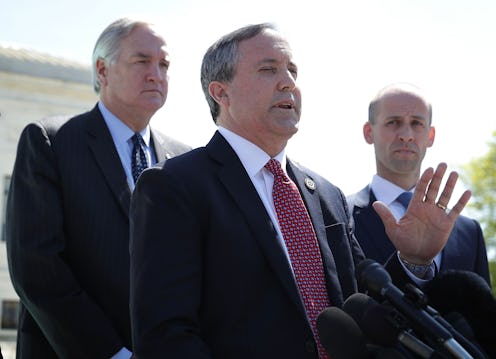News
Texas' Attorney General Is Fueling The Most Flawed Argument Against Gun Control

In the wake of Sunday's horrific shooting at a Texas church that killed at least 26 people, Republican Texas Attorney General Ken Paxton asserted that mass shootings would be prevented if more people carried concealed guns. But research shows that more people having guns does not stop mass shootings. In fact, untrained armed civilians can often complicate police efforts to stop shooters or conduct investigations.
First and foremost, increasingly arming civilians to stop mass shootings is imprudent because civilians are typically not trained to thwart attackers. Data regarding gun violence backs up this assertion. As a 2013 article in The Guardian pointed out, a 2009 academic paper investigating the link between gun possession and gun assault found that those who possess firearms were about 4.5 times more likely to be shot than those who did not. The same study also revealed that during a gun attack, for individuals who "had time to resist and counter," the odds of being shot actually increased 5.45 fold for a person carrying a gun, compared to those for a person not carrying a gun.
Moreover, a 2013 article in Scientific American reported that, in addition to increasing someone's odds of getting shot, gun possession and use during an attack can often result in unintended consequences. A 1998 study in the Journal of Trauma and Acute Care Surgery that found that “every time a gun in the home was used in a self-defense or legally justifiable shooting, there were four unintentional shootings, seven criminal assaults or homicides, and 11 attempted or completed suicides.”
Beyond potentially increasing casualty numbers and doing little to stop an attacker, arming civilians can also hamper the police's ability to stop and/or investigate mass shootings. The recent mass shooting in a Colorado Walmart illustrates this problem.
Newsweek reported that, while investigating this shooting, which left three people dead, police said that they were "absolutely" distracted by armed citizens who drew their weapons during the assault. Police noted that they had to spend much more time investigating each person who had a gun and reviewing surveillance footage in the aftermath of the shooting in order to accurately determine who was actually a civilian and who posed a threat. This took precious investigative time and, in the end, it took police over five hours to identify the shooter.
Thornton Police spokesman Victor Avila expressed police frustrations to The Denver Post: "As soon as you see [a gun], that’s the one you try to trace through the store, only to maybe find out that’s not him, and we're back to ground zero again, starting to look again ... That’s what led to the extended time.”
Gun control advocates also agree that the presence of guns in mass shooting situations also often complicate police's ability to investigate the matter or stop the shooter. As Tom Sullivan, a gun control advocate, told the Chicago Tribune in the wake of the Colorado Walmart shooting, ""Especially [arming] civilians with weapons — it does nothing but possibly cause more chaos and harm."
Finally, arming civilians to stop mass shootings does not reflect a viable solution because making guns more accessible to everyone means that guns are also more accessible to those who wish to cause harm. On the other hand, regulating access for everyone makes it less likely that a gun will get into the hands of a would-be mass shooter.
As a 2013 study on reducing gun violence in the United States pointed out, regulating gun access for everyone does actually reduce gun violence — it doesn't just make guns less accessible for civilians. As the study noted, “Strong regulation and oversight of licensed gun dealers ... was associated with 64 percent less diversion of guns to criminals by in-state gun dealers.”
Gun control efforts in other countries, like Australia, also illustrate this point. After a 1996 mass shooting in which 35 people died, the Australian government engaged in sweeping gun control measures — and there have been no mass shootings (defined as shootings in which 5 or more people died) since these measures were enacted. Notably, the government did not take the route of increasingly arming civilians to thwart mass shooters.
Ultimately, arming more people with guns will do little to prevent future mass shootings — and may even make some of them more deadly. Multiple studies, as well as experiences by other countries, highlight the notion that gun control constitutes one of the most viable ways to curb mass shooting deaths, something which is the exact opposite of arming more Americans.